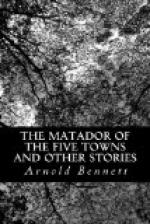“She’s come,” Stephen announced curtly, determined to put trouble off.
“Oh, has she?” cried Vera. “I thought you said she wouldn’t.”
“She hesitated, because she was afraid. But she’s come after all,” Stephen answered.
“What fun!” Vera murmured.
And ran off downstairs back again into the midst of the black coats and the white toilettes and the holly-clad electricity of her Christmas gathering.
II
The news that she had come was all over the noisy house in a minute, and it had the astonishing effect of producing what might roughly be described as a silence. It stopped the reckless waltzing of the piano in the drawing-room; it stopped the cackle incident to cork-pool in the billiard-room; it even stopped a good deal of the whispering under the Chinese lanterns beneath the stairs and in the alcove at the top of the stairs. What it did not stop was the consumption of mince-pies and claret-cup in the small breakfast-room; people mumbled about her between munches.
She, having been sustained with turkey and beer in the kitchen, was led by the backstairs up to Vera’s very boudoir, that being the only suitable room. And there she waited. She was a woman of about forty-five; fat, unfair (in the physical sense), and untidy. Of her hands the less said the better. She had probably never visited a professional coiffeur in her life. Her form was straitly confined in an atrocious dress of linsey-woolsey, and she wore an apron that was neither white nor black. Her boots were commodious. After her meal she was putting a hat-pin to a purpose which hat-pins do not usually serve. She gained an honest living by painting green leaves on yellow wash-basins in Stephen’s renowned earthenware manufactory. She spoke the dialect of the people. She had probably never heard of Christian Science, bridge, Paquin, Panhard, Father Vaughan, the fall of consols, osprey plumes, nor the new theology. Nobody in the house knew her name; even Stephen had forgotten it. And yet the whole house was agog concerning her.
The fact was that in the painting-shops of the various manufactories where she had painted green leaves on yellow wash-basins (for in all her life she had done little else) she possessed a reputation as a prophet, seer, oracle, fortune-teller—what you will. Polite persons would perhaps never have heard of her reputation, the toiling millions of the Five Towns being of a rather secretive nature in such matters, had not the subject of fortune-telling been made prominent in the district by the celebrated incident of the fashionable palmist. The fashionable palmist, having thriven enormously in Bond Street, had undertaken a tour through the provinces and had stopped several days at Hanbridge (our metropolis), where he had an immense vogue until the Hanbridge police hit on the singular idea of prosecuting him for an unlawful vagabond.




